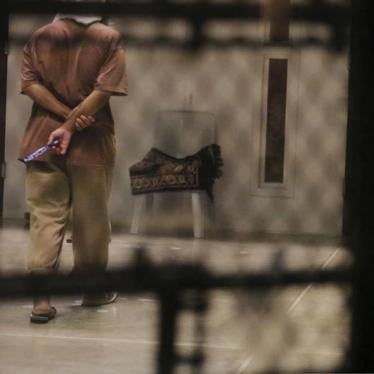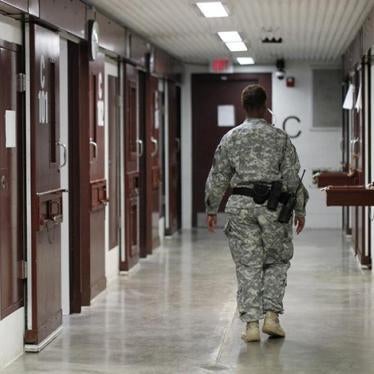July 13, 2017
Protect the Constitution.
Vote “NO” on Schiff Amendments #65 and #66 That Will Likely Lead to Violations of the Fifth and Sixth Amendments of the Constitution.
Dear Representative:
The undersigned human rights, religious, and civil liberties groups strongly urge you to vote “NO” on Schiff Amendments #65 and #66 to the National Defense Authorization Act for Fiscal Year 2018—because they will likely lead to violations of the Fifth Amendment and Sixth Amendment of the Constitution and undermine human rights protections. The amendments were ruled in order for the second set of amendments that will be debated as early as today.
We strongly urge you to vote “NO” on Schiff Amendment #66 because it will likely lead to unconstitutional conduct that would have particularly severe consequences in the death penalty cases now before the military commissions. The amendment authorizes the use of videoconferencing of any “participant[]” in “any matter” before the military commission.
Schiff Amendment #66 raises serious due process concerns. It would allow the judge to conduct military commission trials entirely by videoconference, including proceedings in which the accused or counsel participate only by videoconference, over the defendant’s objection. The Sixth Amendment to the Constitution guarantees a person accused of a crime the right “to be confronted with the witnesses against him,” and the Fifth Amendment guarantees that no one shall be deprived of life or liberty without due process of law. Both rights can be jeopardized when a defendant is involuntarily absent from a trial or hearing. For this reason, the Federal Rules of Criminal Procedure allow for a defendant’s participation in court proceedings by videoconference only if the defendant consents.[1] Witness participation by videoconference is also disfavored.[2] By contrast, Schiff Amendment #66 has no protections and no limitations.
The use of videoconferencing would be particularly problematic in the context of the Guantanamo military commissions. First, these are death penalty cases. Second, defendants at Guantanamo depend on interpreters to understand the proceedings. Third, these cases involve classified information, and the U.S. government takes the position that the accused were exposed to “intelligence sources and methods” by being detained and tortured in CIA custody. Because of this, court proceedings occur with a 40-second delay in the audio feed so that the government can use “white noise” to block access to any purportedly classified testimony, and the defendants are not allowed to speak to their attorneys by telephone. The military commissions prosecution stated in 2015 that, “[i]t is the policy of the United States that, in order to prevent the disclosure of classified information, High Value Detainees (“HVDs”) are not permitted to make unmonitored telephone calls.”[3] These special circumstances at Guantanamo increase the harm to the defendant if he our his counsel cannot be physically present at a proceeding, compounding the Fifth Amendment and Sixth Amendment violations.
While Schiff Amendment #65 is only a sense of Congress resolution, it too could result in Confrontation Clause and due process violations, as well as undue command influence concerns. The amendment lacks any specificity and any protections against unconstitutional misuse of videotaped statements, including videotaping that would deny the defendant his constitutional rights under the Fifth Amendment and Sixth Amendment of the Constitution. Moreover, the amendment may also be an improper attempt to influence the military judges in whether or how they allow victims to give prerecorded testimony by video, which is a live issue before the commissions right now—and which could result in unlawful command influence motions.
For these reasons, we strongly urge you to protect the Constitution, and vote “NO” on Schiff Amendments #65 and #66. Thank you for your attention to this request.
Sincerely,
American Civil Liberties Union
Appeal for Justice
Defending Rights & Dissent
The Constitution Project
Friends Committee for National Legislation
Government Information Watch
Human Rights Watch
National Association of Criminal Defense Lawyers
[1] See Federal Rules of Criminal Procedure, Rule 5(f), Rule 10(c), Rule 40(d), Rule 43.
[2] See Federal Rules of Criminal Procedure, Rule 15 (a defendant has a right to be physically present at depositions unless the defendant waives his or her presence, the defendant disrupts the proceedings, or the witness’s testimony can only be obtained in a foreign country where the defendant’s presence is impossible); Rule 26 (witness testimony must generally be taken in open court). The Uniform Code of Military Justice does allow the accused to appear by videoconference in pretrial proceedings if “at least one defense counsel is physically in the presence of the accused.”
[3] United States v. Mohammed, Government Response to Commission Order on the Joint Defense Motion for Telephonic Access for Effective Assistance of Counsel, March 20, 2015, available at http://www.mc.mil/Portals/0/pdfs/KSM2/KSM%20II%20(AE183H(Gov)).pdf. Even if the government were to change this policy, the accused and their counsel would be unlikely to trust that their telephone calls were unmonitored.








